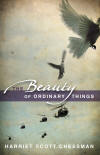The Beauty of Ordinary Things
The Beauty of Ordinary Things, Harriet Scott Chessman’s fifth title, charts the day-to-day battles faced by Benny Finn, having returned from serving in Vietnam, and Sister Clare, a young woman learning the trials and joys of committing her life to a convent. Isabel Howell, Benny’s brother’s gal and Sister Clare’s childhood friend, link the two of them, creating a friendship between Benny and Sister Clare that brings about a sort of healing and acceptance for them both. The beauty in this novel, as the title somewhat alludes to, is in the little things—in this case, elegantly crafted lines from Chessman.
The Beauty of Ordinary Things, Harriet Scott Chessman’s fifth title, charts the day-to-day battles faced by Benny Finn, having returned from serving in Vietnam, and Sister Clare, a young woman learning the trials and joys of committing her life to a convent. Isabel Howell, Benny’s brother’s gal and Sister Clare’s childhood friend, link the two of them, creating a friendship between Benny and Sister Clare that brings about a sort of healing and acceptance for them both. The beauty in this novel, as the title somewhat alludes to, is in the little things—in this case, elegantly crafted lines from Chessman.
As one might imagine (considering the inclusion of a soon-to-be nun), this novel includes many breaches on the topic of religion and Christianity. Benny, raised in a Catholic household, isn’t sure where he stands on the subject, especially after witnessing the violence of the war and the loss of his comrade and friend. Instead of laying out his views or uncertainties in what could become a preachy passage, Chessman instead brings the lens back, setting Benny in a scene where we can see him react:
I also took a picture of this crazy guy who always wore a hat made of tin foil . . . We were on the street outside a Greek deli, and I asked him about his hat. He bummed a cigarette off me before answering, like a deal we’d struck. Then, taking little puffs, like sips, he told me the tin foil protected his mind from the gods, who kept trying to send him messages. What messages? I asked. I could have asked, what gods? He squinted at me as I took the picture, and then he scuttled away, his silver hat glittering in the sun.
The novel is broken into two parts, each chapter switching back and forth between the view from Benny and the view from Sister Clare. The first section almost feels like a love letter from the both of them to Isabel. Benny meets her when his brother brings her home for a visit, and he gets to know her better as he becomes her daily ride to work. After months of talks on the commute, Isabel reveals that she is pregnant and doesn’t know what to do. Benny has fallen in love with her, but hasn’t made a move out of respect for his brother. But at this vulnerable moment, they both briefly lose control: “I can’t tell you what Isabel meant by that kiss. I didn’t want to think about it, honestly,” he says. “I was drunk, but not like it ever felt, drinking.”
And Sister Clare has a deep care for her childhood friend: “Isabel has gone through so much. Sometimes I feel more like her older sister than her friend. Sometimes I even feel like a mother. She thinks of me as so strong, and so confident in my goals.” But Sister Clare’s own struggle is in deciding if she’s ready to commit her whole life to God and the convent.
Luckily for Sister Clare and Benny, the two meet in the second part, and through their time spent together (Benny volunteers his time at the convent, working outside) each of them finds confidence to stride forward. “After a point you start to see that you can survive your own feelings, and the day dreams and nightmares that come to you,” says Benny. “They don’t have to pull you off course.”
My only complaint was that with such a short book, I was surprised by how often I was lost as far as the time/setting is concerned. It flashed forward and backward frequently, and I got lost several times on the jumps.
Overall, this novel is a well-written piece, something I was fully immersed in and read in one sitting. Certainly it’s about religion and faith, but it’s not a testament, and it doesn’t claim to hold any answers. It’s a story of love without the romance, and it’s a tale showing that we all must find acceptance with what was, is, and is yet to come; carry on; and find the “beauty of ordinary things.”





